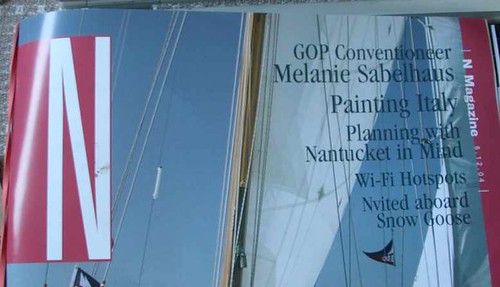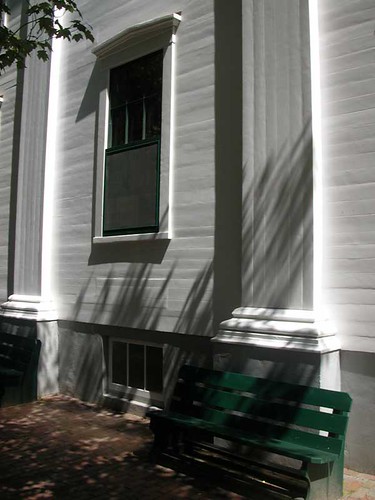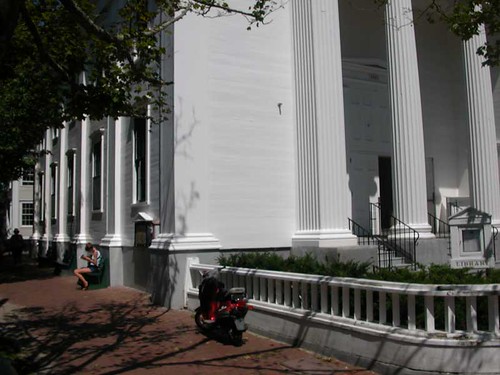A few minutes ago, a police officer passed the bench where I was sitting outside the [edit: Nantucket] Athenaeum, enjoying the mild temperature and the wifi signal, and he said, “Sir, you can’t use the Internet outside the library.”
I said, “What?” (I’m pretty clever under pressure.)
The officer in question (whose conduct was entirely professional, firm, and calm behind those mirrored shades) solemnly assured me that in order to use the library’s open wireless signal, I had to be seated within the library. The officer then wandered on back to the nearby police station.
I dutifully, if reluctantly, turned off the power to my Airport card and, since I had only been on the bench a few minutes, began working — offline — on what turns out to be this post. I had noticed two other weak but open signals in the area, and I figured that I could post this perplexing moment via one of the other open signals, then scuttle back to the studio. As I was writing, the officer returned and — as the officer walked straight for me — I held up my TiBook, pointing to the zero lines in the Airport icon, and showed the officer that my card was off.
“Why don’t you just close that up, sir, or use your computer elsewhere?’
I closed the computer in order not to constitute a threat to established order, but engaged this peace officer in a discussion of the complexities of the topic. “I did notice several other open signals in the area — am I allowed to connect to them?”
“Maybe if you had permission it would be all right, but it’s a new law, sir; ‘theft of signal.’ It would be like if you stole someone’s cable TV connection.”
I responded, “But this is a radio signal thing — it’s not like a cable connection, it’s like someone has a porch light on and I’m sitting on the bench, reading a book by their light. I’m not stealing their light.”
“It’s a law, sir; if someone comes along and downloads child photography (that wasn’t the exact word the officer used) and it goes through their [sc., the access point owner’s] connection, that’s a violation and we’ve had cases of that. That’s a felony.”
(I skip the question of whether it’s less a problem if someone downloads such photos while sitting in the library. Since I’ve already been categorized, however politely, with felons, I thought discretion should prevail at this point.) “Is this a state law?” I asked.
“It’s a federal law, sir; a Secret Service agent came and explained it to us.”
“Look, I don’t want to give you a hard time, and I’m very thankful that you alerted me to this, and I’ve done what you asked, but I’d be very surprised if there turned out to be a federal law forbidding my using an open wireless signal in a public place.”
“Well, you can look it up, sir, and explain it to the chief. . . .”
At this point, it became clear that my uniformed interlocutor had to head in a different direction from me, so we shook hands and parted. And I walked back to the studio, dumbfounded that someone just rousted me for picking an open wireless signal in public — indeed (as it turns out) for using a laptop within a wireless signal’s range of the library. Weird.
posted from a secure hiding place near an open access point. . . .
[Rest of story: here, here, here, here, and if you haven’t seen Gary Turner’s coverage go here too.]


